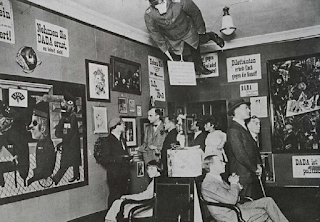AFTER: Art as Resistance and Fuel for Social Change
My query about the ways art can resist led me to one of my favorite theoreticians Gilles Deleuze. He believes the driving force of meaningful art to be the "shame in being a person" and proposes the artwork flourishing from this feeling to be liberating life from the prison of shame. Deleuze considers information systems as systems of control and argues that counter-information only becomes effective when it turns into resistance and art has that transformatory power.
Briefly looking into history, I was exposed to many examples ranging from Bach resisting against the separation of the sacred and the profane in music to the alliance of Native Americans and African slaves bringing us Blues, Jazz and Hip-Hop through their collaborative creative expression. Sometimes the resistance takes the shape of Picasso's Guernica that speaks to us about the pain inflicted by war, but it also takes the shape of DuChamp's Fountain that challenges his fellow colleagues and the institution of art itself.
Then I have listened to a TED talk from Kacey Wong, an "artist citizen" who actively took place in the Umbrella Movement in Hong Kong and resisted doing what he did best: his art. He said even before the movement he wanted to join the resistance but he couldn't find it, so that he himself became the resistance through his art.
Another TED speaker/artist Saba Tay considers making the unrepresented and unseen visible a radical act and a political statement. She argues that the reclamation of power against the dominant narrative to be possible through being an active creative agent. She points to the problems of the art at the institutional level, how one's access to it is granted through the lines of race, class, education etc. and underlines the importance of art outside of those structures; the public domain and alternative spaces.

Comments
Post a Comment